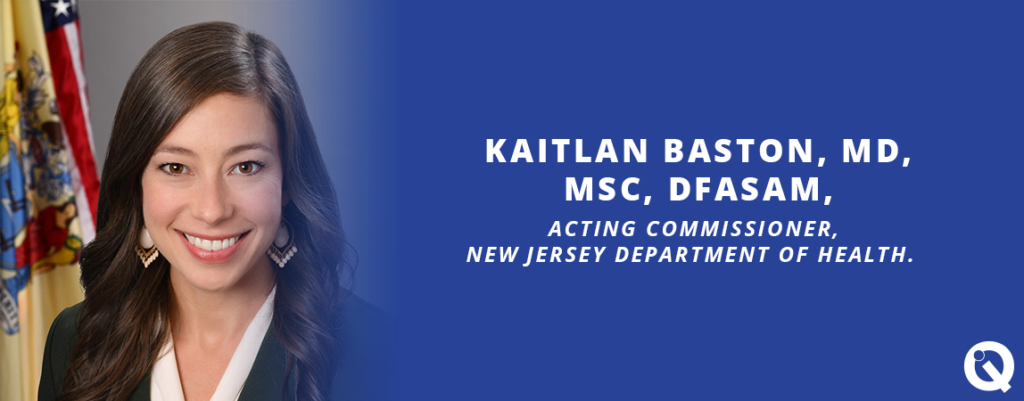Prior to becoming New Jersey’s Acting Health Commissioner, you created and led the Cooper Center for Healing, an integrated pain, addiction, and behavioral health center that is part of Cooper University Health Care. How will that experience inform your leadership of the Department of Health?
First and foremost, the experience as a leader working in health care and public health keeps me humble — and learning. I love that.
As a family physician, for a long time, I had what I like to call a bio-psychosocial approach to medicine. It’s people’s health and wellbeing. It’s mental health and everything about the way people live their lives. When building the Cooper Center for Healing from the ground up with that focus on public health — I was able to integrate those aspects of health from the very beginning.
Do patients have access to transportation? Do they have access to food, to housing, to childcare, to childcare items along with their health care and their mental health care? Integrated health care is essential, and I’m thrilled to bring that lens into the public health sphere as Acting Health Commissioner. It’s a vision of care dramatically different from what is happening today on the ground but I believe we can get there.
The Quality Institute has called for an integrated license for primary care and behavioral health care to reduce stigma, increase access, and better integrate physical and mental health care services. Can you update us on the status of the creation of an integrated license?
Yes, it’s very exciting and is already in progress. We have incredibly close ties to the Department of Human Services, and Commissioner Sarah Adelman and I speak frequently on this issue. It’s more than just allowing an integrated license — it’s celebrating integrated care with both departments focused on how to make it sustainable. I expect to have the integrated license ready soon.
Also, the Department of Health has passed several waivers to allow for things that were unfortunately caught up in the separation of those licenses in the past. And we’ll continue to focus on addressing mental health and substance use disorder and harm reduction and health. We look forward to working together with the Department of Human Services on deploying opioid settlement funding and other areas of collaboration.
Can you describe the steps your department is taking to make sure the residents of nursing homes and assisted living centers are adequately monitored — and that facilities are providing quality, or at least satisfactory, services?
This remains one of our top priorities. Our regulatory oversight, which is ongoing, is guided primarily by CMS requirements. Our two-pronged approach first includes survey teams that are routinely going out to inspect facilities and to respond to complaints on the ground such as safety, quality, and staffing ratios.
The second prong, which began under Commissioner Judy Persichilli’s leadership and, in my opinion, is the most innovative is our Office of Long-Term Care Resiliency. We have since grown this work and continue to build on the initial model. This office contains interdisciplinary health care teams – or Mission Critical Teams — that are deployed to long-term care facilities identified as needing support. It’s about building resiliency and improving the quality of care in a nursing facility in a non-punitive way.
We have also built our Office of Financial Transparency to get better indicators of when long-term care facilities are struggling financially.
Our aging health care workforce and workers leaving due to burnout are driving a health care shortage in New Jersey and nationally. What steps can the Department of Health take to support and expand our workforce, and to obtain better data to plan for the future in our older and diverse state?
This is another top priority for 2024. We have support from the CDC through a public health infrastructure grant that is helping us rethink and rebuild for the future. We’re creating a new Office of Workforce Planning and Professional Development. We’re working on creating appropriate pipeline programs along with supporting skill building and training of our existing workforce. Retention is our focus and the goal is to build pipeline programs and career path stepping stones. We want to build a workforce that is from communities for communities.
Finally, we like to ask a question beyond a person’s professional work. If you could choose anyone (throughout history or alive today), who would be your hero?
Top of mind is my paternal grandfather, Gerhard Elston. He died when I was only nine years old, and so my memories of him are a mix of him teaching me and singing to me in German as a child, and the stories that my family tells about him. He was a Holocaust survivor who turned that experience into an incredible life. He was a civil rights activist. He worked for Amnesty International. He marched at Selma and spent so much of his life dedicated to trying to make the world a more equitable and better place. He was able to celebrate joy and fight for things in a way that brings people together rather than driving them apart. He is my inspiration.

